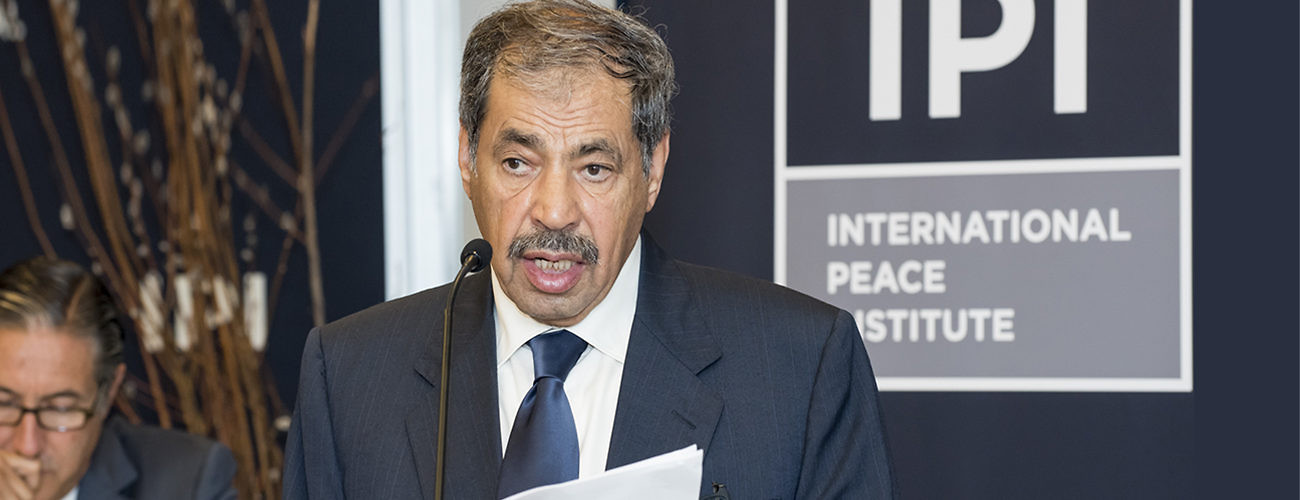Promoting an international peace culture is essential to achieving the United Nations Sustainable Development Goals (SDGs), Kuwaiti poet and activist Abdulaziz Saud Al-Baptain told an IPI audience on September 7th at an event entitled, “Advancing the Culture of Peace.”
Focusing on a culture of peace is “a continuous course that we must not stop,” said Mr. Al-Baptain, who is the Director and Founder of the Al-Baptain Foundation, which promotes intercultural dialogue based on understanding, respect and peace.
“I am sure we can develop a joint interactive action into a larger scale,” he said, “and these activities will include non-governmental institutions and NGOs to promote a culture of peace and continuous dialogue.”
The event played on the commonalities of two major UN initiatives—the 1999 Programme of Action on a Culture of Peace, and the 2030 Agenda for Sustainable Development.
Addressing the topic in introductory remarks, IPI President Terje Rød-Larsen said, “Recently instead of asking what causes war and how can we fight it, people have been asking, ‘What makes a peaceful society, how can we build it, and how can we sustain it?’”
To answer these questions, he said, “We must explore the connections between culture, peace, security and development. The concept of a culture of peace unites all of these.”
Picking up on Mr. Al-Baptain’s point, outgoing General Assembly President Peter Thomson said, “With sustainable development and sustainable peace standing together, it’s clear we must do what we can to create an environment for success, cultivating a culture of peace. He noted that that message was “a defining one” in the development of the SDGs and represented the best framework for achieving success in the future.
“Building sustainable peace requires comprehensive approaches that bridge human rights, peace and security, and development,” he said, adding that this kind of thinking had only “recently been operationalized by the UN.”
Gillian Bird, the Permanent Representative of Australia, singled out achieving UN coherence and establishing predictable financing, both focuses of many past UN reviews, as ways of minimizing risk and maximizing the “dividends of peace” going forward.
She commended UNESCO’s global initiative for building a culture of peace through education and empowerment as the kind of “driver of peace” that people ought to focus their energies on instead of concentrating just on “drivers of conflict.”
One specific driver of peace that she recommended acting on was incorporating the conclusive finding that the involvement of women increases the chances for prevention and resolution of conflict. By way of evidence, she said that “gender equality appears to be a better indicator of peacefulness than the strength of democracy or GDP.”
Masud Bin Momen, Permanent Representative of the People’s Republic of Bangladesh, highlighted early childhood education “critically relevant.”
“One of the most effective ways to mainstream the culture of peace across societies,” he said “is to install the underlying values of tolerance, diversity, inclusivity, and pluralism starting with young impressionable minds.”
On the matter of making coherent the many actions emanating from the UN, Oscar Fernandez-Taranco, Assistant Secretary-General for Peacebuilding Support, pointed out that “the people who receive, require and expect the support of the United Nations don’t ask if they’re coming from this, that, or another part of the UN.”
“The UN has one flag,” he concluded. “It’s everybody’s flag, and that’s what the billions of people with whom we engage intensely expect.”
IPI Vice President Adam Lupel moderated the discussion.








